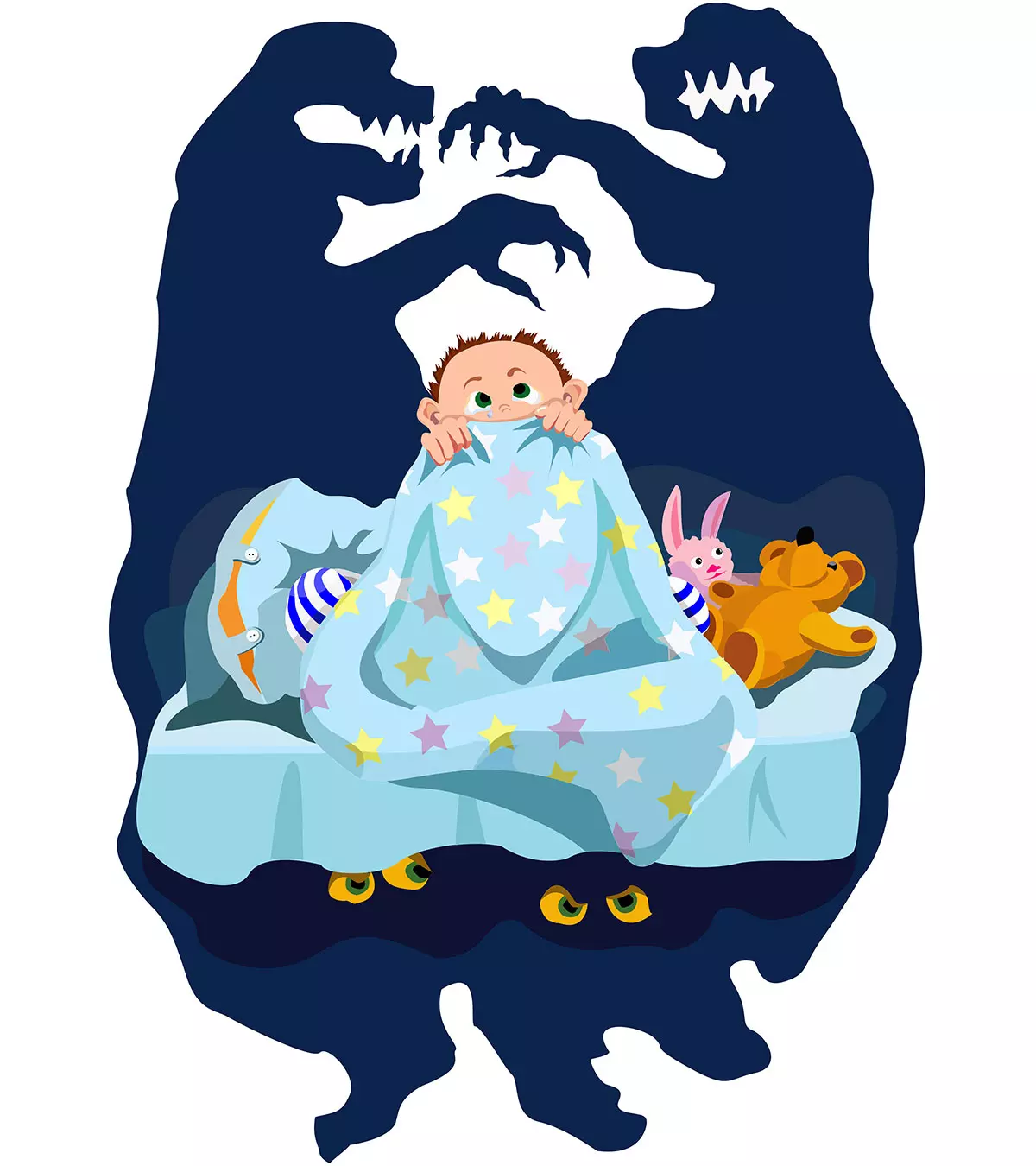
image: Shutterstock
A 3-year-old’s sleep regression could be due to hyperstimulation of their senses caused by a toddler’s swift learning and development. This rapid development may cause a shift in their sleeping pattern. A toddler who would sleep well would suddenly show a change in sleeping patterns. They would have disturbed sleep and may even be cranky after waking up. These sleep regressions usually last a few weeks (1).
As per the American Academy of Pediatrics, nearly 20 to 50 percent of children may be affected by sleep disorders, including sleep regressions. Therefore, they are not uncommon, and you may have observed your child go through them since infancy (2).
A child goes through sleep regressions at four months, six months, 12 months, and 18 months. However, you may have successfully established a healthy sleep routine by two years for them. Hence, encountering a sleep regression at three years could seem difficult. Do not worry, as this is temporary. Here’s more on what you can expect during sleep regression during this age.
Key Pointers
- A three-year-old’s sleep regression usually occurs due to developmental milestones, a normal part of growing up.
- Phobias and changes in the ambient environment are some problems that may lead to sleep regression.
- Sleep regression and changes in sleep patterns do not last more than four weeks. If they do, consult a doctor.
How Long Does The Three-Year Sleep Regression Last?
Like any other sleep regression, the three-year-old’s sleep regression lasts for a few weeks(3)
. If the underlying cause of the regression can be identified, the regression might end sooner by addressing the issue. However, in most cases, the cause of regression is not known. A little patience is needed to go through this phase.
What Causes The Three-Year Sleep Regression?
While the causes for three-year-old’s sleep regression are not always known, some factors are believed to lead to it.
1. Developmental milestones

Three-year-olds develop several social, motor, and language skills. All these changes in growth and development may overwhelm the child, causing temporary disruptions in their sleep pattern. Physical changes and developmental milestones may also be the reasons for sleep regressions.
Three-year-olds learn to climb, run, walk, and cycle. They also begin to experience a wide range of emotions and may exhibit emotional development attributes, such as concern for a crying friend and showing affection. The developed emotional intelligence makes the toddler more prone to becoming upset, leading to sleep regression (4).
2. Fears, phobias, and nightmares

Three-year-olds begin to develop a vivid imagination, and the newly developed imagination brings many fears as well. So, if you see your toddler waking up at night, nightmares can be a possible reason. Nightmares are very common in children between the ages of three and six years (5). Although most children outgrow them, this fear might bring sleep regressions.
 Be watchful
Be watchful3. Environmental changes

Many children move to their toddler bed from their crib at around three years of age (6) (7). Many children also begin to go to nursery school or daycare at about three years of age. This is also the age for a new sibling in the home, which is a very common cause of sleep regression in toddlers. These changes in their surroundings might make them seek more attention at home, and they might begin to exhibit signs of sleep regression.
According to New York-based clinical psychologist Dr. Shelby Harris, “Starting daycare or preschool is a big change for toddlers and can affect their sleep. New routines might cause overtiredness or anxiety, making bedtime harder than usual. While these sleep changes can be frustrating, they are normal and usually signal positive development in kids.”
4. Changes to their nap schedule
Some children begin to drop their naps once they are three years old (2). They are very active at this age, and they don’t want to miss any fun by napping. This may lead to exhaustion by the end of the day. If they go to bed very tired, they remain hyperstimulated and won’t be able to get enough sleep.
Tips To Manage Sleep Regression In A Three-Year-Old
The following parenting tips may make it a little easier to go through this testing phase (6).
- Establish a bedtime routine. Follow the routine and the timings as much as possible.
- Keep the bedroom ambiance cool, calm, dark, and comfortable.

- Turn off the bright lights 30-60 minutes before bedtime. Bathing them or reading them bedtime stories for toddlers may also help transition them to a calmer state of mind before laying them on the bed.
- Set a limit to the number of books you will read to them or the number of songs you will sing.
- Ensure the bedroom is free of any screen time and strictly use it as a place to sleep.
- All screen time should be ideally stopped two hours before bedtime.
- Limit snacks and drinks before bed to minimize bathroom breaks at night.
- Support your child and be gentle while explaining to them the importance of following the bedtime routine.
 Quick tip
Quick tip- If your toddler won’t sleep due to fear, get a night light to keep the room dimly lit. Talk to them. Try to find out if something is bothering them emotionally.

- If the toddler seems to have separation anxiety, check in on them briefly during nap time and night sleep.
- If the bedtime sleep struggles are at a peak already, do not keep on discussing it all day as it may increase their bedtime anxiety and make the toddler resist sleep more.
It is common for parents to experience frustration, and tiredness and get dependent on coping techniques, such as co-sleeping or holding the child while sleeping. The American Academy of Pediatrics does not recommend these for the safety of the child (3). Remember that it is a phase, and the toddler will soon return to the usual sleeping patterns.
 Quick fact
Quick factWhen To See A Doctor?
Most sleep regressions pass within three to four weeks without the need for medical intervention. However, you may contact a healthcare provider if your toddler displays any of the following conditions.
- Snoring, unusual noises, or pauses in breathing while asleep
- Excess sleepiness during the day
- Toddler displays changes in behavior during waking hours
- Frequent sleep disturbances due to nightmares
- Sleep regression persists for more than four weeks
Frequently Asked Questions
1. What time should a 3 year old go to bed?
The recommended bedtime for a 3-year-old child is before eight in the evening. It is essential to establish a consistent bedtime routine and create a relaxing environment to help them get a good night’s sleep. Irrespective of their bedtime, it’s important to ensure they get 10-13 hours of sleep (8).
2. How do you know when sleep regression has ended in a 3-year-old?
Sleep regression in a 3-year-old usually lasts a few weeks and can end when the child adjusts to changes in their schedule or environment. Signs that sleep regression has ended include your child sleeping through the night, taking longer and more restful naps, improved mood and behavior, and increased energy and activity levels (9).
3. What age is the biggest sleep regression?
According to sleep experts, the four-month sleep regression, which drastically alters a baby’s sleep pattern, is considered the largest among all the other regressions (10).
4. What not to do during sleep regression?
During your child’s sleep regression phase, don’t let them stay in their bedrooms before bedtime, and remove screen time from their bedtime routine. Furthermore, try not to rush to comfort them or pick them up when they wake up crying (11)
Establishing a bedtime routine, keeping the lights dim, and limiting snacks before bedtime can help with night waking or sleep regression in three-year-olds. However, consult the doctor if you notice signs of behavioral change or sleep regression lasting more than four weeks. It is not something to worry about if your three-year-old does not show signs of sleep regression. It might occur a few days before or after they cross the three-month mark. It is essential to have patience and support for your child to help overcome this phase.
Infographic: What Are The Signs Of Sleep Regression In A Three-Year-Old Child?
Sleep regression can come and go during early childhood. Knowing the signs of sleep regression can help you differentiate between sleep disturbances and other sleep-related conditions requiring medical care. Go through the infographic to learn the signs of sleep regression in three-year-old children. Illustration: Momjunction Design Team
Illustration: 3-Year-Old Sleep Regression: Causes And Tips To Manage It

Image: Stable Diffusion/MomJunction Design Team
Having a toddler who won’t sleep can be stressful. The video below includes some tips on how to deal with sleep regressions. Learn how to get your toddler back to sleeping through the night.
References
1. Everything you need to know about 9-month sleep regression; CHOC Children’s
2. Children and Sleep; Sleep Foundation
3. Infant Sleep Regressions; SleepAdvisor
4. Important Milestones: Your Child By Three Years; Centers for Disease Control and Prevention
5. Night terrors and nightmares; NHS
6. Sleep in Toddlers & Preschoolers; Cleveland Clinic
7. Baby care – moving from cot to bed; Victoria State Government
8. How Much Sleep Do Babies and Kids Need?; Sleep Foundation
9. Child regression: What it is and how you can support your little one; UNICEF
10. Understanding and Navigating Sleep Regressions; PennMedicine
Community Experiences
Join the conversation and become a part of our nurturing community! Share your stories, experiences, and insights to connect with fellow parents.
Read full bio of Dr. Elham Raker
- Dr. Shelby Harris is a licensed clinical psychologist and the Director of Sleep Health at Sleepopolis, where she specializes in behavioral sleep medicine to help individuals overcome various sleep disorders, including insomnia and narcolepsy, through non-pharmacological treatments. Board-certified by the American Academy of Sleep Medicine, Dr. Harris is also the author of The Women’s Guide to Overcoming Insomnia.
 Dr. Shelby Harris is a licensed clinical psychologist and the Director of Sleep Health at Sleepopolis, where she specializes in behavioral sleep medicine to help individuals overcome various sleep disorders, including insomnia and narcolepsy, through non-pharmacological treatments. Board-certified by the American Academy of Sleep Medicine, Dr. Harris is also the author of The Women’s Guide to Overcoming Insomnia.
Dr. Shelby Harris is a licensed clinical psychologist and the Director of Sleep Health at Sleepopolis, where she specializes in behavioral sleep medicine to help individuals overcome various sleep disorders, including insomnia and narcolepsy, through non-pharmacological treatments. Board-certified by the American Academy of Sleep Medicine, Dr. Harris is also the author of The Women’s Guide to Overcoming Insomnia.
Read full bio of Dr. Ritika Shah
Read full bio of Rohit Garoo
Read full bio of Vidya Tadapatri

















